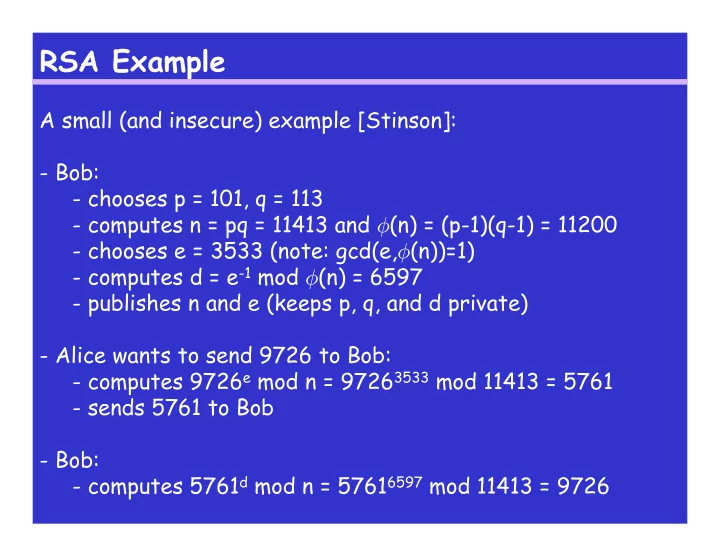

RSA Example A small (and insecure) example [Stinson]: - Bob: - chooses p = 101, q = 113 - computes n = pq = 11413 and φ (n) = (p-1)(q-1) = 11200 - chooses e = 3533 (note: gcd(e, φ (n))=1) - computes d = e -1 mod φ (n) = 6597 - publishes n and e (keeps p, q, and d private) - Alice wants to send 9726 to Bob: - computes 9726 e mod n = 9726 3533 mod 11413 = 5761 - sends 5761 to Bob - Bob: - computes 5761 d mod n = 5761 6597 mod 11413 = 9726
RSA Correctly Decrypts Need to show that for any plaintext m ∈ Z n , (m e ) d mod n = m. We will need some number theory: If gcd(m,n)=1: - we will use Euler’s Theorem (pg 81): If gcd(a,n)=1, then a φ (n) ≡ 1 (mod n) - can we conclude that (m e ) d mod n = m ? If gcd(m,n)>1: - we will use the Chinese Remainder Theorem (Section 3.4)
Chinese Remainder Theorem Suppose m 1 ,…,m k are pairwise relatively prime positive integers, and suppose a 1 ,…,a k are integers. Then the system of congruences x ≡ a i (mod m i ) (1 ≤ i ≤ k) has a unique solution modulo M = m 1 m 2 …m k , which is given by x = ∑ i=1…k a i M i y i mod M, where M i = M/m i and y i = M i − 1 mod m i , for 1 ≤ i ≤ k.
Chinese Remainder Theorem Example: We want to find x that satisfies the following congruencies: x ≡ 5 (mod 7) x ≡ 3 (mod 11) x ≡ 10 (mod 13) The solutions is unique mod ____: x =
RSA Correctly Decrypts, part 2 If m is not divisible by p: If m is divisible by p:
RSA Correctly Decrypts, part 2 So, for all m: (m e ) d ≡ m (mod p). What can we conclude ?
RSA: Computational Issues We showed that RSA works (i.e., correctly decrypts). But… Can we actually compute m e mod n for very large numbers ?
RSA: Computational Issues We showed that RSA works (i.e., correctly decrypts). But… Can we actually compute m e mod n for very large numbers ?
RSA: Computational Issues Want: algorithms polynomial in the length of n. What is the length of n ? Note: typically when estimating the running time of an algorithm, arithmetic operations are counted as taking constant time – but this is NOT feasible in cryptography where the numbers can be very large (recommended size of p,q in RSA: 1024 bits)
RSA: Computational Issues Modular Arithmetic: Give upper bounds (using the big-Oh notation) on the running time of the following operations in Z n : - addition - difference - multiplication - exponentiation - gcd - inverse - RSA encryption - RSA decryption
RSA: Computational Issues Modular Arithmetic: Give upper bounds (using the big-Oh notation) on the running time of the following operations in Z n : - addition - difference - multiplication - exponentiation - gcd - inverse - RSA encryption - RSA decryption
Recommend
More recommend